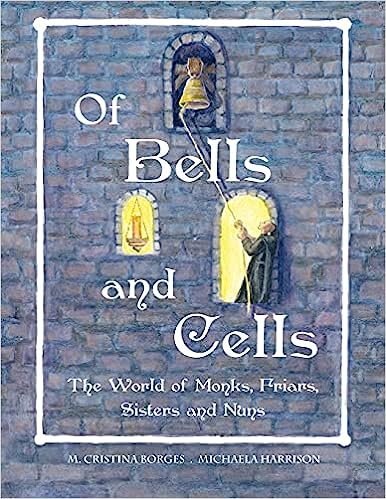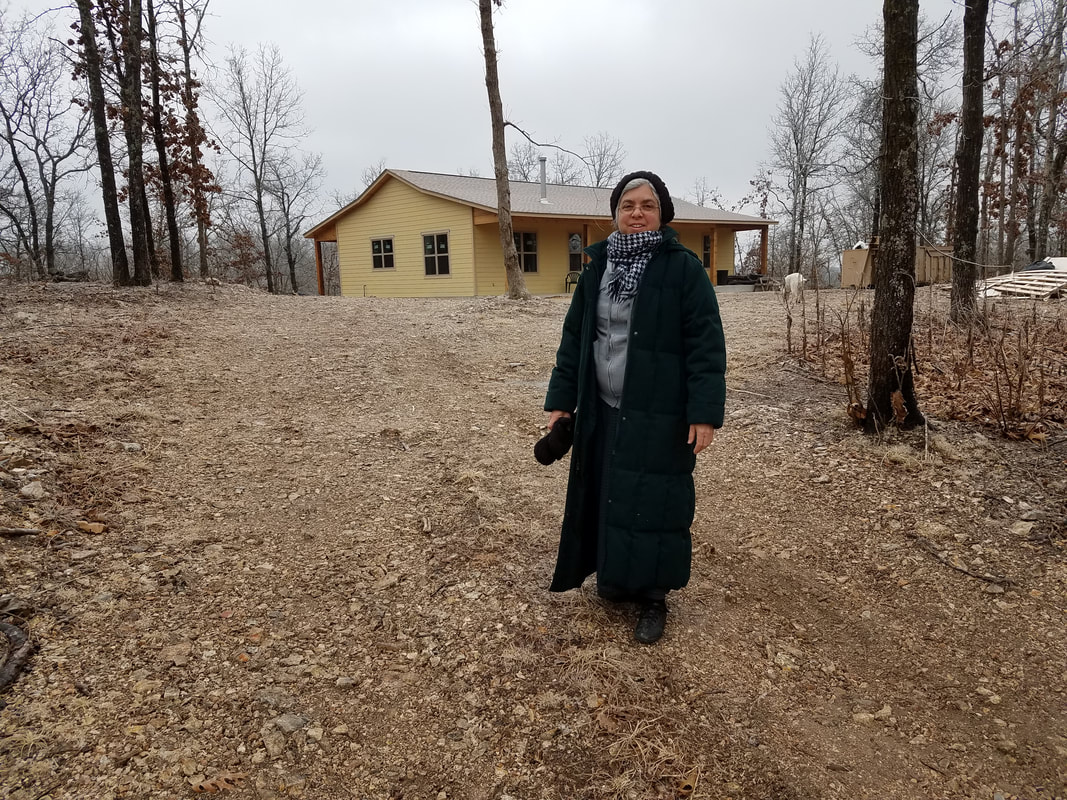|
On May 25, 2023, the Clear Creek community lost a true daughter of the Church. Maria Cristina Bernardelli Borges was born in New York City to Brazilian parents at the close of the 1950s, the last sane decade in recent American history. I would like to say that we were the best of friends, but perhaps we were too alike, having been born on the same day in the same year. We both self-published books about religious life that took us over a decade to finish. We both aspired to religious life, but were hindered in doing so by family obligations. Most importantly, we were both blessed to be Benedictine oblates of Clear Creek Abbey. I met Cristina when she moved with her mother, Zelia, to Oklahoma in 2015 from Chicago, where she had been working for the Institute of Christ the King. I liked her immediately and hoped we would become good friends. Apparently she had acquired a choice piece of land near the Abbey gate, because my first memory of Cristina is her telling us the story of how after walking the property she planned to build a house on, she ended up totally covered with ticks! She seemed unfazed, as though it were all just part of the penitential life of Clear Creek, an opportunity to offer sacrifice to the Lord for the rare privilege of living so close to the Abbey. Shortly thereafter, I was surprised to learn that she had translated a scholarly work on Madame Cecile Bruyere, the first Abbess of Solesmes, from the French. Cristina was talented in multifaceted ways, but she wasn't ostentatious about it. One had to get to know her to learn of these gifts, because she never talked about herself (a virtue I have yet to acquire). Cristina's charming book for children on religious orders, Of Bells and Cells, complemented by the winsome, inspiring illustrations of Michaela Harrison, happily filled the gaping void in Catholic vocational literature for that age group. I highly recommend it for all Catholic homes with young (and not so young) children. Cristina worked for the Catholic media powerhouse, EWTN, for many years, mostly behind the scenes, assisting with Portuguese translations from broadcasts from Fatima and helping to establish EWTN's European affiliates. So naturally, when Of Bells and Cells came out, she was interviewed by Doug Keck on EWTN's "Bookmark." This is a very happy thing for those of us who sorely miss her presence, because we can still see and hear her with the simple click of a button. (And you can, too.) Cristina's intelligence was surpassed only by her generosity. When I was seeking reviews for my novel a couple of years ago, I asked Cristina if she would provide one, and she graciously agreed. I ended up getting much more than I had asked for. In the novel, I had included in Spanish dialogue certain words that I knew phonetically, but that I did not know how to spell. Her fluent knowledge of Spanish enabled her to spot several mistakes I had made just using an online translator, and others besides. If it weren't for her diligence and generosity, my novel would have contained numerous embarrassing errors. In recent years, Cristina devoted herself tirelessly to caring for her frail, elderly mother. When she was diagnosed with cancer last year, she fought it back, but as often happens, the cancer returned. Never once did I hear her complain. We had hoped and prayed to keep Cristina with us many more years, but it seems that Our Lord had other plans. He wanted this sweet, humble, and generous soul all for Himself. Dearest Cristina, my Benedictine sister, pray for us.
3 Comments
I have written a novel in which the Catholic Church qualifies as one of the main characters. This was not done on purpose. But as the story progressed, it became clear that during the time period in which the novel takes place (1999–2019), the Church like all good characters underwent fundamental changes and faced extreme challenges. Rather than sweep this conflict under the rug, I chose to embrace it in the hopes that it will make the protagonists' adventures more meaningful to the reader and more efficacious in facilitating their own spiritual and vocational journeys.
It should be obvious to anyone who reads In the Palace of the Great King that the author is a devout Catholic. Like the proverbial disclaimer given by those who offer their uneducated opinions on art, "I don't know theology, but I know what I like." Or, in my case, love. In other words, I can't claim to be a theologian or an apologist, and so I can't tell you all the reasons why I believe the Catholic Church is the only church founded by Jesus Christ and why despite all her flaws and flagrant sins, everyone ought to join it. There are plenty of other places where you can glean that information. In the end, conversion occurs due to grace and not the efforts of anyone else. Still, you need to inform yourself about the Catholic faith. Only then can grace work in your soul. That being said, I must offer one caveat. The twenty-first-century Church is comprised of a wide-ranging collection of practices ranging from feminist, earth-centered, peace-and-justice-loving "spirituality" whose adherents refuse to refer to God with masculine pronouns and insist on introducing endless variations such as holding hands in a circle around the altar at what they call "the liturgical celebration," not the Mass, all the way over to the other end of the spectrum in which we have those who believe the Church hasn't had a legitimate pope in over fifty years. In between you have the beleaguered bulk of Catholics who practice a very laid-back version of the faith according to the modernist teachings promulgated since the disastrous pastoral (as opposed to dogmatic) council in the early 1960s known as Vatican II. In these parishes, there are no lines for confession on Saturday afternoons (the Sacrament of Penance, now known as "Reconciliation") because most priests have been brainwashed, if not outright ordered, to no longer use the words "sin" or "sacrilege" in their homilies for fear of offending someone. Consequently, becoming Catholic today requires not only that you learn what the Church teaches and embrace it fully, but that you carefully discern which of the various camps of church teaching is authentically Catholic. This is quite a feat of acrobatics and not for the faint of heart. The fact that Our Lord benignly continues to put up with all of this nonsense is truly miraculous. Both rites (the new post-Vatican II "Novus Ordo" and the original Tridentine Rite, known as the TLM (Traditional Latin Mass) or in official documents, the Extraordinary Form of the Roman Rite, are valid. Just because they are both valid, however, does not mean they are the same. Nor does it mean that they are equal in the eyes of God, if I may be so bold as to claim to know God's thoughts on any topic. To me it's like taking Beethoven's Ninth Symphony and Queen's "Bohemian Rhapsody" and saying, are these both musical? Yes, they are. Is one objectively superior to the other? Yes, obviously. Maybe you happen to like Freddie Mercury's operatic exercise about sin and nihilism: "Bee-EL-zebub has a devil put aside for me..." For your sake, I hope not. But the question before the court today is not what do you like, but what does God like? Which version of the Mass do you think He prefers? If as a society we have lost the ability to distinguish between two pieces of music and collectively judge one as superior to the other, we are in bad shape. If as a society we have lost the ability to put aside our own personal tastes in favor of music, art, and architecture more proper to the worship of God than, say, a Holiday Inn conference room or an elementary school gymnasium, God may forgive us our deplorable ignorance, but I for one do not intend to so succumb to Liturgical Time Bombs. There are many who understandably feel that God doesn't really care about all our little rituals or whether or not we pray in Latin, but rather, what matters is what comes from the heart. In one respect that is true, and a sincere prayer from the heart is always pleasing to Our Lord. But this isn't what I'm talking about. I'm talking not about personal, individual prayer here. I'm talking about communal (group) prayer, the official prayer of the Church, offered in the person of Christ by Catholic priests. I'm talking about the Mass. I could go on ad infinitum, but as I said in the beginning, I am not an apologist or a theologian. Better for you to read about it from the experts. Thankfully, there are many. There are no doubt a number of very good (meaning reverent) Novus Ordo Masses out there offered by good priests who are holding the line against the liberal agenda. My personal advice: find an FSSP parish and start going to Mass there. If necessary, move out of state. Talk to the priest. Learn about the faith. Pray the Rosary daily. And then hunker down and hang on for dear life. Oh, and please buy my book. |
Archives
June 2023
Categories
All
The opinions expressed on this website are my own personal views and do not necessarily represent those of the Catholic Church.
If I have erred in any statement, whether directly or by implication, in any matter pertaining to faith or morals, I humbly invite fraternal correction. |


 RSS Feed
RSS Feed
